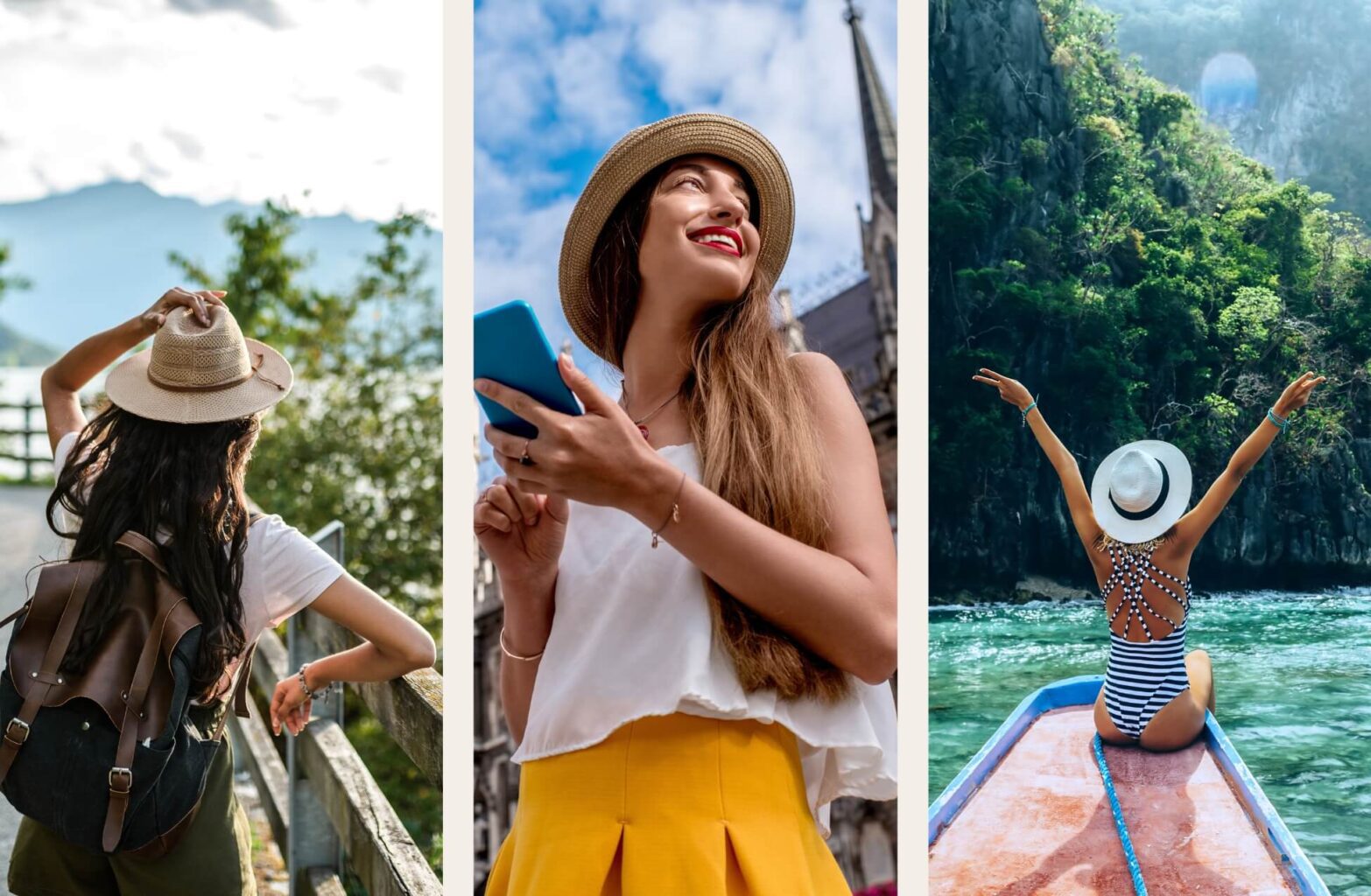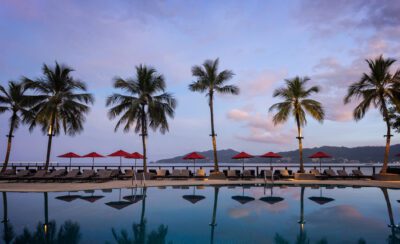As we approach 2025, the travel landscape is undergoing significant transformations. Driven by sustainability, innovation, and evolving traveller preferences, these emerging trends offer a glimpse into the future of tourism. Whether it’s escaping overtourism, seeking cultural immersion, or embracing solo travel and sustainability, these trends highlight a shift toward more intentional and impactful travel experiences. The Women’s Journal take a a deep dive into all of the travel trends shaping 2025 and beyond.
How Social Media is Inspiring Travel Trends
According to a new Advantage Travel Partnership report, 38% of Gen Z travellers seek travel inspiration on TikTok and Instagram. Additionally, the 2024 State of Student & Youth Travel Report by StudentUniverse revealed that 70% of the 4,000 surveyed students worldwide use TikTok as a trip-planning tool.
Commenting on the report, gap year travel business owner and Academy Director at SIA Austria, Gary Clark said: “It’s great to see that technology is having such a positive effect on younger travellers. These community-based social media platforms are uniting travel enthusiasts from around the world and providing them with a space to share ideas and insights with a personal touch.
“It’s well-known that Gen Z favours unique and authentic experiences over opulence and also take sustainability into consideration. Such platforms are excellent for generating ideas and shaping the next travel trends with a focus on immersive and mindful journeys.”
There’s no doubt social media is inspiring travel trends with Gen Z steadily paving the way for more conscious, meaningful and authentic travel experiences, blending technology with a desire for your unique adventures. With a focus on community-building, platforms such as TikTok and Instagram can inspire and motivate travellers to take the road less travelled.
2025 Travel Trends
The Anti-Tourism Trend
There has been a big increase in anti-tourism movements and the consequences of mass tourism hit a fever pitch in 2024. According to the Lemongrass Annual Travel Trend 2025 report, this isn’t the result of ‘bad’ tourism per se, but rather poorly planned and managed tourism – even in regions largely dependent on it.
Destinations have responded with a wide spectrum of solutions: In Barcelona, local authorities removed a bus route from Google Maps to stop tourists from jumping on board. Tourists now encounter alcohol restrictions in Spain’s Balearic Islands. Daytrippers must pay a fee in Venice. And a massive barrier now blocks a picture-perfect view of Mt. Fuji1 in an attempt to keep overcrowding at bay.
Along with governmental regulation and planning, there is an opportunity to promote awareness and educate travellers about the link between sustainability and overtourism. This is what is happening in Copenhagen which incentivises tourists for participating in climate-friendly behaviour like using bikes and taking the train by providing perks such as free kayak tours. This is similar to the Palau Pledge, which requires travellers to commit to eco-responsible practices; this response to the overtourism problem recognises the positive impact of tourism by empowering travellers.
Speaking about the anti-tourism trend, Sustainable Travel Expert, Holly Tuppen said: “The disastrous consequences of unregulated and irresponsible tourism development for people and the environment is nothing new, but several
factors are making more authorities and local people take notice.
“The proliferation of low cost rental accommodation, via the likes of Airbnb, has caused tourism to manipulate local economies, in some cases forcing local people out of towns, cities, and villages with inflated housing costs. Combined with congested roads and burdened infrastructure (made worse by the continued untaxed growth of the aviation and cruise sectors), for some local people the cost of tourism now outweighs the benefits.
“Unregulated tourism is also an additional squeeze on resources and the environment, which are already under pressure due to the climate crisis. Let’s hope the industry moves towards stricter regulation, collaboration, and the widespread adoption of holistic sustainability (both social and environmental) quick enough to maintain its reputation as a positive contributor.”

Sustainable Travel
Sustainability has become a cornerstone of modern travel. With increasing awareness of the environmental impact of tourism, travellers are seeking ways to minimise their footprint. Destinations like Copenhagen are incentivising eco-friendly behaviour with perks like free kayak tours, while campaigns like the Palau Pledge ask visitors to commit to eco-responsible practices.
Travellers now prioritise nature-positive experiences, such as agritourism and rewilding projects, which support local communities and biodiversity. As sustainability becomes a risk manager for the tourism industry, destinations that embrace eco-conscious practices are likely to thrive.
Even as people become more aware of their environmental footprint, they’re hesitant to give up the comforts they’ve come to expect on their travels. Many new boutique properties and lavish accommodations have been built in recent years using more eco-conscious design practices. They’ve focused on issues like waste reduction, plastic elimination, and water conservation, but the question remains – can luxury properties truly be sustainable?
Founder of A’ARU Collective, Kelly Forbes said: “Achieving sustainability in luxury hospitality starts with a mindset shift: when we stop seeing it as downgrading the luxury experience or a compromise and start recognising it as adding value through authenticity, innovation, creativity, and forward-thinking, only then will hoteliers truly elevate the luxury experience and ensure their properties stay sustainable. The next generation of luxury guests will see sustainability as essential, so embracing this perspective now is key.
“We’re beginning to see this shift, but it can still be a challenge to get it right. Balancing high expectations with eco-friendly practices and social impact requires creativity, financial investment, and a real commitment to reimagining luxury in a way that’s both environmentally and socially responsible. It means adopting a more circular and inclusive approach that benefits not just the environment, but also the community.”
Frontier Travel
Travellers are increasingly drawn to remote and untouched destinations. Frontier tourism involves exploring off-the-beaten-path locations, from Pakistan’s Hunza Valley to the pristine landscapes of Tajikistan. These experiences not only offer unique adventures but also support the economic development of underserved communities.
However, this trend raises ethical concerns about environmental impact. For destinations like Antarctica, increased visitor traffic threatens fragile ecosystems. Responsible tourism operators are emphasising sustainable practices to ensure long-term benefits for both travellers and host communities.
The untouched and less-explored often appeals more to Gen Z travellers, especially to those seeking novelty. The Advantage report found that 29% of Gen Z consumers want to travel to lesser-known destinations to explore and avoid the crowds.
With an array of content creators sharing their experiences and insights on social media, discovering one-of-a-kind experiences is easier than ever, especially if you’re willing to do a bit of research. For instance, interest has surged in lesser-known city break destinations such as Porto and Copenhagen.

Female Solo Travel
Solo travel is becoming increasingly mainstream, particularly with women’s travel. Empowered by safety-focused travel options and supportive communities, female solo travellers are exploring destinations independently.
Cruise lines and tour operators are tailoring experiences to solo travellers, offering dedicated cabins and group trips that provide both safety and flexibility. Platforms like TikTok and Instagram are also fostering a sense of community, with women sharing tips and stories to inspire others.
The Rise of Destination Dupes
With overtourism plaguing popular hotspots, many travellers are opting for alternative destinations that offer similar experiences without the crowds. Instead of Venice, consider Ljubljana. Swap Sydney for Perth, or choose Paros over Santorini. These “destination dupes” provide budget-friendly and less crowded alternatives, reshaping travel planning.
Search data shows a surge in interest for these hidden gems, driven by platforms like TikTok and Instagram. Countries like France are actively promoting lesser-known regions to disperse tourism more evenly across the nation.
The rise in ‘destination dupes’ and alternative destinations are not only considered hidden gems but might also come with potential savings. Think about switching Santorini for Paros, Sydney for Perth, or London for Liverpool. If you want to discover more exciting dupe destinations, check out Expedia’s ‘dupe’ badge of honour when booking through the platform.
The Resurgence of Inter-railing and Train Expeditions
Train travel is making a comeback as an eco-friendly and immersive way to explore the world. Long-distance routes like the Canadian or the Indian Pacific in Australia offer travellers the chance to experience breathtaking landscapes and cultural shifts at a slower pace.
Advancements in rail technology and infrastructure are also making train travel more accessible and efficient. With significantly lower carbon emissions than flying, train journeys are becoming a preferred choice for environmentally conscious travellers.
Back in the 1990s, inter-railing across Europe was the go-to adventure for young gap year travellers, and it’s seeing the light of day once again. Travelling by train provides an authentic way to connect with local communities, offering a chance to dive into the culture and essence of multiple places in one trip. It’s an immersive journey where you can witness the everyday life of different regions as you pass through. Today, inter-railing is gaining popularity as a unique and enriching way to travel.
Just as many trends from the ’90s are having a resurgence among Gen Zs, travel trends are no exception. The recent Advantage Travel Partnership report show that 46% of Gen Zs are not only travelling more frequently but are also opting for more eco-conscious modes of travel, with a particular preference for trains. Additionally, 34% of them are enjoying the benefits of faster and more reliable rail services.
Whether you choose to embark on the high-speed sleeper train experience running from Hong Kong to Shanghai and Beijing, or explore the lesser-known destinations in the UK with the ‘Zillenial‘ Railcard, the rail industry is replete with many distinctive and eco-friendly travel options tailored towards Gen Z.
Local Culture Immersion
The Advantage survey identified another trend among Gen Z travellers: culturally enriching experiences. Forty-three percent of the surveyed consumers echo that desire, with 31% seeking opportunities to deepen their knowledge about the destination. Unlike carefully curated tourist traps and packaged holidays that offer a glossed-over version of a place, destination deep dives are embracing cultural immersion.
As travellers seek more authentic experiences and a deeper connection with the location, 25% of the survey respondents are interested in community-based travel. This can involve staying with the local community to learn about their culture and heritage or joining a community-centred travel experience such as a gap year ski season, nestled in the beautiful mountains of a small resort, or volunteering in Africa. Such experiences may not be for everyone, but they certainly fit Gen Z travellers, giving them a chance to enhance their self-discovery, openness and acceptance to the world, and cultural enrichment.
Learning about other’s culture first-hand also has a profound effect on traveller’s eco-consciousness. According to the survey, 22% of the respondents seek travel destinations that positively impact people, places, and the planet, with the goal of leaving a meaningful imprint and supporting local wellbeing.

Grounding Getaways
The desire to reconnect with nature is nothing new but ‘grounding’, or ‘earthing’, is a growing trend that emphasises physical connection with the earth to promote wellbeing. Wellness resorts are offering grounding activities, such as barefoot walking and river immersion, to help travellers de-stress and rejuvenate.
Destinations like Germany’s Black Forest have even launched barefoot trails, allowing visitors to explore nature in a tactile and mindful way. This trend taps into the broader movement of wellness tourism, which prioritises holistic health and connection to the environment.
Ethical Tourism
Transformational travel is evolving to include ethical considerations. Travellers are seeking experiences that allow them to learn and contribute positively to local communities. Programs like volunteering, cultural exchanges, and sustainable retreats are on the rise.
Brands that prioritise authentic connections and support local economies are gaining traction. These experiences not only enrich the traveler but also leave a positive impact on host destinations, fostering mutual growth and understanding.
Travellers are seeking transformative experiences by brands that authentically reflect and care for the planet and communities in which they operate. In fact, 79% of Millennials and Gen Z said the quality of an experience is more important than the price.
Sales and Marketing Manager at Rainforest Expeditions, Rocio Guzman said: “At Rainforest Expeditions, we have seen an increase in purposeful travel. Travellers coming to our ecolodge are interested in wildlife, but they are also concerned about the actions behind the conservation of the area.
“For us, every detail that is part of this experience must be consistent with the sustainable development of the region and its people and the preservation of the Amazon rainforests. Today, the traveller ceases to be a tourist and becomes an experience seeker who wants to ensure they leave a positive impact on the place they visit.”
Micro and Macro Travel
Travel in 2025 is adapting to lifestyle changes, with two distinct trends emerging: micro and macro travel. Micro travel involves short, intensive trips designed to maximise limited time, often catering to budget-conscious travellers.
In contrast, macro travel focuses on extended stays, driven by the flexibility of remote work. Long-term sabbaticals and slow travel are becoming popular among those seeking deeper connections with their destinations. Both trends highlight the adaptability of modern travel to individual needs and preferences.
On the micro-tourism side, Google Trends indicates searches for ‘best short vacations’ are up 100% over the past year. Likely responding to the cost-of-living increase, more people are taking five days or less of annual leave to travel, squeezing in as much as possible within those few days.
Slow Adventure is not a reality for micro-tourists (whether by choice or circumstance) as they fully maximise their limited time, yet it’s well-aligned for those embracing macro-tourism. The Lemongrass Annual Travel Trend 2025 report states that these macro-travellers are ‘going big’ with long, extended stays either in a single or multiple destinations. These holidays may be part of a golden or midlife gap year, sabbatical, or second honeymoon.
The macro-tourism holiday is largely related to the relatively new ability for people to work remotely. This has created opportunities for hospitality brands such as Accor to cater to hybrid lifestyles by combining the comforts of home with the convenience of hotel services. People are keen for that extended stay: Google Trends indicates worldwide searches for ‘long stay holidays’ are up 23% over the past year. Similarly, the term ‘sabbaticals’ has also reached ‘breakout’ status on Google search in 2024.
Cool-Cations
Rising global temperatures are reshaping travel preferences. Destinations with cooler climates, such as Scandinavia or the Alps, are becoming increasingly popular. Google Trends data shows a 300% increase in searches for ‘cooler holidays’, reflecting this shift.
This trend aligns with the broader awareness of climate change, as travellers look for destinations that are both comfortable and environmentally responsible.

Tofu Tourism
The rise of veganism is influencing travel, with more destinations catering to plant-based diets. Vegan tours, cooking classes, and animal sanctuary visits are becoming popular among travellers seeking ethical and sustainable options.
The increased interest in vegan-related travel is well aligned with a more sustainable future – both within the tourism industry and throughout society. Animal agriculture and meat consumption greatly contribute to the creation of greenhouse gas emissions, deforestation, and water pollution. When choosing vegan-infused holidays, travellers take a significant step toward reducing their environmental footprint.
Spontaneous Travel
Last-minute bookings are on the rise as travellers prioritise flexibility in uncertain times. Spontaneity allows for budget-friendly trips and the thrill of unplanned adventures. Hospitality brands are adapting by streamlining booking processes and offering incentives for late planners.
Bolthole Retreats‘ Managing Director, Rebekah England said: “Our observations reveal that many staycation bookings are being made within the month of travel, with our data showing that lead times for bookings have reduced by 14% year-on-year from 2023 to 2024.
“This shift towards spontaneity reflects a broader change in how people approach their holidays. Rather than meticulously planning months in advance, more travellers are embracing the flexibility of last-minute arrangements. Spontaneity allows them to navigate the financial landscape more effectively, without committing to travel and financial outlay too far in advance.
“For us, as a UK-based holiday let agency, this trend has shaped our approach to bookings. If a property has availability, we make it easy for our guests looking to book at the eleventh hour through our direct website or with support from our customer service team. From streamlining our booking processes to offering a last-minute availability page on our website, we’re committed to meeting the needs of today’s spontaneity seekers.”
Sensory Travel
Sensory travel is emerging as a growing trend, offering travellers immersive experiences that engage all five senses – sight, sound, touch, taste, and smell. This type of travel goes beyond traditional sightseeing, creating deeper emotional connections with destinations. From the soothing sounds of Icelandic waterfalls to the vibrant flavours of Moroccan spice markets, sensory travel appeals to those seeking mindfulness, cultural enrichment, and memorable moments.
It also caters to neurodiverse travellers by providing tailored, sensory-friendly experiences. As wellness and experiential tourism continue to rise, sensory travel is becoming a key way for individuals to disconnect from daily stress and reconnect with the world around them.
Founder of The Conscious Travel Foundation, Olivia Cryer commented: “Travel in its very nature is an intense sensory experience – from the sights, the sounds and the smells, to the languages, cultures and landscapes, and the pace and rhythm of a journey. Travelling with a neurodivergent child has thrown this into sharp focus for us, having to accommodate sensory sensitivities, difficulty with changes in routine, and challenges in unfamiliar environments.
Basic steps such as providing sensory-friendly spaces, offering detailed itineraries to help manage expectations, and training staff to be sensitive and responsive to the needs of autistic travellers can make an enormous difference. Whether that’s alerting clients to the possibility of crowds, waiting times, and noise, or providing alternative options to avoid situations that neurodivergent individuals may find overwhelming.”





